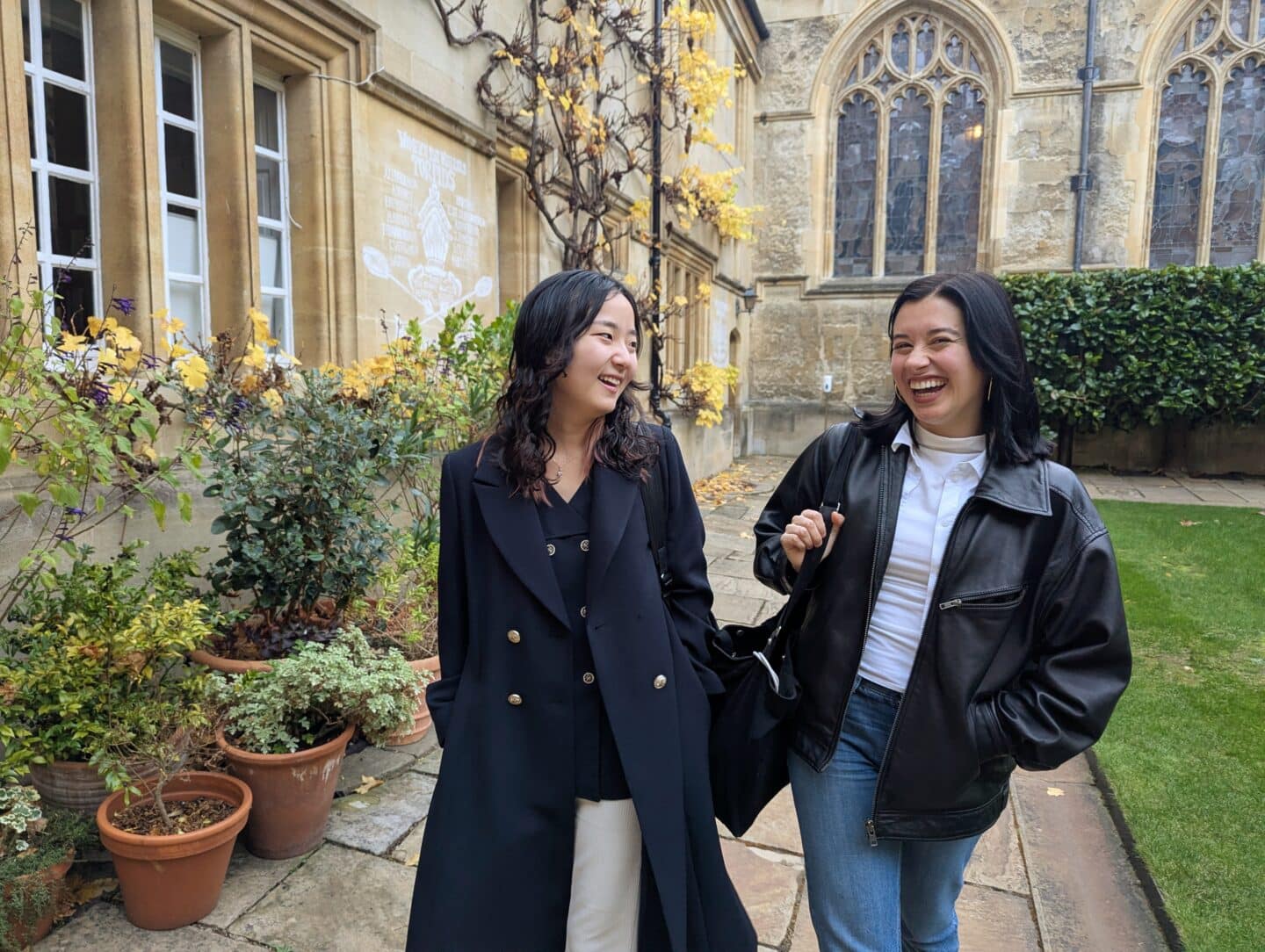
With great pride, we welcome two new Marshall Scholars, Jaeah Kim and Mónica Ruiz House, who joined Lincoln this academic year. Marshall Scholarships provide support for students to pursue graduate studies or a second BA.
Lincoln has had a longstanding connection with the Marshall Scholarships (overseen by the Marshall Aid Commemoration Commission) and is thankful for the generous support of Lincoln alumni and former Marshall Scholars of Lincoln. Over the years, the College has welcomed other Marshall Scholars, including alumna Dr Meena Seshamani(1999), who served as President of the Association of Marshall Scholars.
Several of our former Marshall Scholars have given generously to support current Marshall Scholars. We’ve been able to combine that support with the Goldey Scholarship in Politics, also created by alumni in honour of David Goldey renowned Fellow in politics at Lincoln, to create a Marshall Scholarship in Politics/International Relations.
Jaeah and Mónica join current Marshall Scholar Olivia Holder, who came to Lincoln in 2020 to pursue an MPhil in Visual, Material and Museum Anthropology, and is now undertaking a DPhil in History of Art. Before coming to Lincoln, Olivia completed her undergraduate studies at the University of North Carolina at Chapel Hill, and received a Master's in China Studies from the Yenching Academy of Peking University as a Yenching Scholar.
About our 2025 Scholars
Jaeah Kim, a graduate of Stanford University and a Goldwater Scholar, has published neuroscience research in Cell and developed several award-winning healthcare innovations. As a Marshall Scholar, she will pursue an MSc in Applied Digital Health at Lincoln College and an MSc in Biomedical Innovation at Birmingham.
Jaeah said, "I first applied to the Marshall Scholarship because it offered a rare chance to step outside of my familiar academic environments and learn in a different cultural and intellectual context. But the meaning of the scholarship has deepened for me over time. The Marshall represents a relationship between two countries grounded in shared values and mutual commitment. To me, being a Marshall Scholar means taking seriously the responsibility to contribute to that partnership by working toward solutions to challenges that affect us all. I feel honoured to be part of that tradition."
Mónica Ruiz House, a graduate of the University of Chicago, received her university's highest undergraduate honour, the Sonnenschein Medal of Excellence, for her dedication to immigrant justice and humanitarian work. As a Marshall Scholar, she is pursuing an MSc in Criminology and Criminal Justice (2025-26) and an MSt in Refugee and Forced Migration Studies (2026-27).
Mónica said, "As a former grassroots organizer, I was taught how to confront inequality, but not necessarily to understand it. The Marshall Scholarship’s partnership with Lincoln offers a rare chance to do both by bridging the practical with the theoretical. Here, this "radical space of possibility" has given me the tools to imagine what a just world actually looks like."
About the Marshall Scholarships
The Marshall Scholarships were established by the UK Parliament in 1953 to strengthen postwar US-UK relations and to express gratitude for foreign aid via the US-led Marshall Plan. Enshrined in an Act of Parliament, making it unique among its peers, the Scholarship was designed to benefit Anglo–American relations in perpetuity.
The first class of scholars was selected in 1954: eight men and four women. Although the scholarships initially placed students only at Cambridge, the scholarships soon allowed high-achieving American graduates to study at any UK university. Its network of scholars have gone on to make an impact in a wide array of fields, from academia and public service to business, arts and beyond. Since its inception, Marshall Scholarships have brought more than 2,000 Americans to study at universities in the UK, funded mainly by the UK Government through the Foreign, Commonwealth and Development Office (FCDO).
Selection is managed through eight regional centres based on the Consulates General and the British Embassy. The criteria for selection include academic merit (e.g. academic achievement, a thoughtful proposal for the course of study and how it integrates with future scholarly and career plans); leadership potential (e.g. ability to deliver results, strength of purpose, creativity and a strong desire to contribute to society); and ambassadorial potential (e.g. knowledge of US-UK relations, the ability to engage with others, self-confidence and the ability to seize opportunities).
